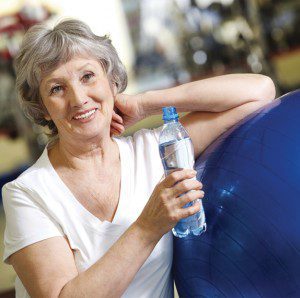By Janet Calderwood, Registered Dietitian –


Staying hydrated is something that most of us do without even thinking about it, even living in Southwest Florida where temperatures can be elevated throughout most of the year. We rely on our thirst sensation to guide us. For aging people however, drinking enough fluids can be a challenge. Seniors are especially vulnerable to dehydration, a term which is used to describe a water deficit, a result of many factors. For one, as we get older, we may experience a reduced thirst perception. Certain medications like diuretics and laxatives, infections, vomiting, diarrhea and fever are just a few of the common reasons that seniors may experience inadequate hydration. A study published in 2012 by The Journal of Nutrition found that even mild dehydration can affect your mood and energy level.
How much fluid is enough? 80% of our fluid needs are met by drinking. The Institute of Medicine recommends that women should consume 2.7 liters of total water from foods and beverages each day (approximately 9 cups) and men should consume 3.7 liters of total water from beverages and food (approximately 12 cups). 20% of fluid needs are met by consuming fruits and vegetables. Strawberries, lettuce and radishes, along with many others, are greater than 90% water. Of course, fluid needs may be increased or decreased based on medical conditions like congestive heart failure, for example. To maintain proper hydration, it is important to replace all of the body fluids that are lost through perspiration, urination, stool and pulmonary evaporation. Checking your urine color can help individuals determine hydration status. A light straw colored urine is good, a dark color like apple juice may indicate inadequate hydration. Of course, urine color may be a bright yellow right after taking a multivitamin supplement.
Water is still the beverage of choice when it comes to staying hydrated. There are many other options for those who just dislike the taste of plain water, including coffee, tea, juices, dairy beverages, jello and soups. For people that enjoy caffeinated beverages like coffee and tea, in moderation, they can still contribute to one’s overall fluid intake. An average beverage contains 100 milligrams (mgs) of caffeine and the dietary reference intake is 300 mgs per day. For those who have difficulty sleeping, it is probably good idea to avoid caffeinated beverages 3-6 hours before bedtime.
Dairy beverages, also high in overall water amount, can be an effective way to obtain a lot of other key nutrients like protein, calcium and vitamin D. Soups may contain a lot of sodium so choosing low sodium varieties may be beneficial especially for people with hypertension. When choosing beverages, be careful to limit those that have a lot of added sugars and calories which can lead to weight gain.
It is a good idea to start sipping on fluids early so that by the end of the day, you will have already met your fluid requirements. Otherwise, you may find yourself getting up several times during the night to go to the bathroom. For some of you, drinking fluids will require an effort because you just may not feel thirsty. Keeping a water bottle with you at all times can help you remember the importance of staying hydrated.
Janet Calderwood is a registered dietitian and board certified specialist in gerontology who is host of “Dietitian on a Mission” television show which airs locally on CNT channel 10 on Friday mornings at 10 am. Janet works at Life Care Center of Estero and comes with an excellent clinical and educational background with a gift for teaching. On Thursday March 27th from 4-5:30pm Life Care Center of Estero will be hosting a nutrition seminar presented by Janet. We hope you can attend, as the discussion will be informative and entertaining. Please RSVP by March 24 by calling our outpatient at 239-495-4046.
 Southwest Florida's Health and Wellness Magazine Health and Wellness Articles
Southwest Florida's Health and Wellness Magazine Health and Wellness Articles
